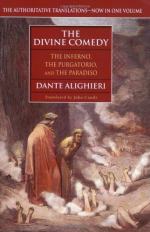|
This section contains 6,963 words (approx. 24 pages at 300 words per page) |

|
SOURCE: Pelikan, Jaroslav. “The Otherwordly World of the Paradiso.” In Eternal Feminines: Three Theological Allegories in Dante's Paradiso, pp. 11-31. New Brunswick, N.J.: Rutgers University Press, 1990.
In the following excerpt from an essay originally delivered as a lecture in 1989, Pelikan discusses the theological foundations of the Paradiso, concluding that Dante closely followed St. Augustine's insistence on surrendering to God's will.
As even the cursory examination of a bibliography on Dante or of a library card catalog will suggest, the third and final cantica of the Divine Comedy by Dante Alighieri, the Paradiso, has, for whatever reason, received considerably less attention than the other two. On the other hand, the Inferno is the most prominent—perhaps because it is the first, or possibly because it is the most vividly dramatic, or probably because it is existentially the most accessible to the reader. Yet the Paradiso is in many...
|
This section contains 6,963 words (approx. 24 pages at 300 words per page) |

|


